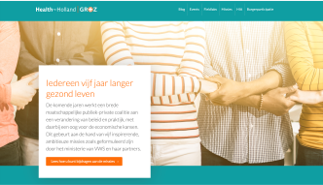
Chapter 6
GROZ
From national to local
INTERVIEW
with Jan Smelik, general coordinator of Nederland Zorgt voor Elkaar
From national to local: that is the dream of Jan Smelik, chair of Austerlitz Cares and general coordinator of Nederland Zorgt voor Elkaar (The Netherlands Care For One Another - NLZVE) and member of Theme Team of the societal theme Health & Care. ‘We must move towards a system in which health and a healthy living environment are central’, says Smelik. ‘Citizens must live, work and go to school in a healthy environment, and that takes place in the neighbourhood. So we are really talking about the local level.’
Smelik is not the only one who holds this opinion. Various care initiatives, set up locally by citizens, are mushrooming. ‘We counted them again last year’, says Smelik. ‘We have 1500 initiatives on the radar: 5 years ago, there were only 500 initiatives. You can see an enormously rapid growth of care- and welfare-oriented initiatives and citizens collectives.’
Many of these local initiatives are members of regional networks, which are affiliated as a member of NLZVE. ‘Netherlands Care For One Another is a nationwide network of citizens collectives. For us, it is about residents who organise things together.’ An example of such a collective is Austerlitz Cares, the care cooperative that Smelik founded in the village where he lives.
Citizens in the central role
‘Local initiatives are the citizens’, says Smelik. ‘It is the living environment that organises it: that is the basis of the movement from care to health.’ Smelik advocates decentralisation of care, with more attention and energy for the neighbourhood level. The regional system will support the local system, after which the national system will further support the regional system.
‘That pyramid, with the national level on top and local on the bottom, has to tilt’, says Smelik. ‘In fact, the local level must become leading: everything below it must be subservient to the upper level. And at the top of that model are the citizens, who organise their own care, both the formal and informal care. The regional level must be in line with this and be complementary to what is organised locally.’
The pyramid, with the national level on top and local on the bottom, has to tilt
From triple helix to quadruple helix
Since 2019, citizens have been more explicitly involved in the Mission-driven Top Sectors and Innovation Policy: we have evolved from the triple helix, in which companies, government and knowledge institutions had a place, to the quadruple helix where citizens are now an equal partner too. ‘And it’s about time’, says Smelik. ‘After all, citizens know best what is needed in their own neighbourhood.
The care and prevention measures that are important to keep the residents healthy vary between neighbourhoods: they must fit within the environment. In a neighbourhood where many people live with debt, you should focus on debt counselling. In another neighbourhood, there may be a lot of loneliness, which means you have to focus on organising social activities.
‘This is not a movement that says: we design one concept and then we roll out citizens collectives everywhere’, says Smelik. ‘You have to take care of what is needed locally.’
Paradigm shift
In addition, national healthcare policy does not yet have the right focus. Although that focus has already shifted from disease and care to health and behaviour, another paradigm shift is needed: the focus must shift from the individual to the community. ‘Communities must play a much more important role in policy’, says Smelik.
‘The problem is that, in the Netherlands, we have always regarded citizens as individuals’, he explains. ‘The government tackles many health problems with campaigns that influence behaviour at an individual level. But many of these problems accumulate in the vulnerable segments of the population, and they are not responsive to this type of campaign.’
Indeed, it has been shown that individual preventive measures tend to increase the health differences between people with low and high socioeconomic status. ‘You really have to design preventive actions in a completely different way by targeting communities. People are prone to copy each others’ behaviour. For a healthy living environment, you have to target the whole environment, not just the individual.’
GROZ
At Health~Holland, we also see an important role for citizens and the focus on health instead of care. GROZ was launched in 2018 to stimulate this. Smelik also played an important role here. ‘GROZ is actually the first movement from Top Sector LSH in which local initiatives are the starting point, in which we strive for a different way of organising health and care’, says Smelik.
‘It really is the reversal of traditional care: how can we make health available to the population?’ The emphasis is on strengthening the connection and collaboration between formal and informal care and health. The informal aspect takes place in the local citizens collectives.
Smeliks’ extensive experience with citizens collectives came in handy: ‘One of the most important things we have learned is that enabling people to participate in society and make a difference according to their ability is an important element in healthy ageing. That keeps you young, and that keeps you healthy. Just having a hospital or doctor nearby is not enough. And that is our focus as citizens collectives.’

Citizens are essential for success in European innovation policy
If Europe genuinely wants to use its new innovation policy to successfully tackle major societal issues, then it will have to involve other governments, citizens and stakeholders. This is the Rathenau Instituut’s conclusion in its report “The promise of an assignment targeted innovation policy”. This report demonstrates the central position of societal challenges within the innovation policy for artificial intelligence and the transition towards a sustainable economy (the European Green Deal). It also states what the Dutch government can learn from this.
For a long time, the innovation policy of the European Union and the governments of its Member States mainly focused on stimulating technological development and innovative companies. In recent years, the focus has shifted towards tackling societal issues. Therefore in 2019, the Dutch government started with its Mission-driven Top Sectors and Innovation Policy. Part of the Dutch government’s contribution to innovation now goes towards projects that contribute to the Netherlands becoming more climate and water resilient, sustainable, healthy and safe.
The European Union seems to be going a step further still with its innovation policy by taking major societal issues as a starting point and then reasoning which innovation policy is needed to tackle these. The European Commission wants to use the new Research and Innovation Programme Horizon Europe, which runs from 2021 to 2027, not only to reinforce the innovation capacity and competitive position of European companies, but also to realise the six strategic goals that the Commission has stated.
Dutch policy
As this more assignment targeted policy can only be successful if society adopts the innovations too, then according to the Rathenau Instituut, the EU must involve citizens and their concerns at an early stage. Within the Green Deal, this already seems to be happening more often than with the development of artificial intelligence. Because the EU has only limited qualifications in different areas, it is also important to involve national, regional and local governments in good time.
Although the new European innovation policy is still in the preparatory phase, it contains clear elements that are relevant for the Dutch innovation approach as well. Besides the early involvement of citizens, it states the government’s clear guiding role and the team effort of different ministries.
EU
must involve citizens and their concerns at an early stage
Thirty experts
‘The Netherlands should be actively responding towards these types of developments in the European innovation policy’, says Melanie Peters, director of the Rathenau Instituut. ‘If the European and Dutch innovation policy complement each other, complex problems such as climate change can be tackled more easily. Moreover, it will enable the Netherlands to continue being a successful participant in European innovation programmes.’
For this research, the Rathenau Instituut analysed, amongst others, policy documents from the European Commission and the Dutch government. Furthermore, interviews were held with over thirty experts.
Source: Rathenau Instituut
Brand-new website GROZ.nl!
Great news, the new GROZ website has been launched! As the GROZ movement is continuing to grow, this website was really needed. The website is entirely in Dutch and specifically aimed at the target audience of GROZ. It provides information about GROZ and how this movement contributes to achieving the Health and Care coalition’s missions.
Moreover, it showcases the GROZ field labs. These are places where citizens, health professionals, entrepreneurs and (national and local) government organisations are collaborating to fulfil the mission of living five years longer in good health and reducing health inequities by 30% in 2040. Finally, there is information on the Health Impact Accelerator – a programme for social entrepreneurs. The page also gives details about how to participate in the next 2021 edition.
Quarterly sessions GROZ
The various health and care coalition partners meet every quarter to learn about and discuss GROZ’s activities in relation to Knowledge & Innovation Agenda 2020-2023. The next meeting is scheduled on 18 May 2021.










